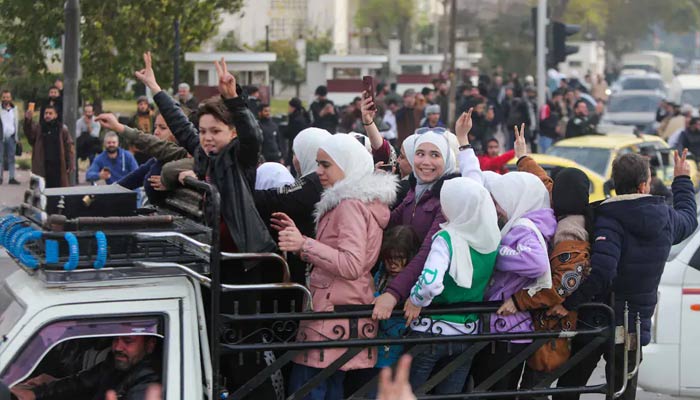Syrian rebels seized control of the country’s capital Damascus and President Bashar al-Assad’s sprawling palaces as the 59-year-old autocratic leader fled the war-hit country.
And landed in Moscow where he was given asylum following the toppling of his 24-year-old regime by opposition forces in a lightning offensive. Meanwhile, the US said that its forces conducted numerous airstrikes against Islamic State targets in Syria amid the rebel takeover.
The Islamist-led rebels and Syrians rejoiced at the sudden end to the 13-year-old civil war, saying it marked “the end of a dark era” and strolled through Assad’s presidential palaces, taking away items of furniture or ornaments and posing for photographs in different rooms.
The Hayat Tahrir al-Sham (HTS) group began its lightning offensive two weeks ago, capturing the key cities of Aleppo, Homs, Hama before proceeding to Damascus unopposed and seizing control of the Syrian capital on Sunday. Government forces loyal to Assad were forced to retreat as rebels captured control of key cities one by one, in a move that challenged the Assad family’s nearly six decades of autocratic rule.
Bashar al-Assad is in Moscow with his family after Russia granted them asylum on humanitarian grounds and a deal has been done to ensure the safety of Russian military bases, Russian state media reported. Moscow earlier claimed that Assad had given orders for a peaceful transfer of power before fleeing.
Top rebel commander Abu Mohammed al-Golani, whose HTS was once Syria’s branch of al-Qaeda but has softened its image over the years, celebrated Assad’s fall and said a “new history was being written” after a “great victory”.
Mohammad Ghazi al-Jalali, Syria’s Prime Minister under Assad, batted for free elections and said he was in contact with Golani to discuss the transfer of power to a transitional governing body. Syria had been ruled by the Assad family for over five decades, with Assad taking power in 2000 following the death of his father, Hafez Assad.
The Syrian rebel coalition said it was working to complete the transfer of power to a transitional governing body with executive powers. “The great Syrian revolution has moved from the stage of struggle to overthrow the Assad regime to the struggle to build a Syria together that befits the sacrifices of its people,” it said in a statement.
Joe Biden said the United States will work with partners and stakeholders in Syria to help seize an opportunity and manage the risk. He added that the US will support Syria’s neighbours through the period of transition and will assess the words and actions of rebel groups.
Meanwhile, the US Central Command said its forces conducted dozens of airstrikes on Islamic State targets in central Syria on Sunday. It said the strikes were aimed at preventing a resurgence of the Islamic State in the war-torn country.
Rebels freed hundreds of prisoners who were locked up for decades during Assad’s rule. Inmates reunited with their families in emotional moments and held up their fingers to gesture how many years they had spent in prison.
Israeli Prime Minister Benjamin Netanyahu said Assad’s fall was thanks to blows Israel had dealt to Iran and its Lebanese ally Hezbollah, once the lynchpin of Assad’s security forces.
Amid the celebratory moments, some men ransacked shops and walked away with essentials before rebels declared a curfew. Posters, banners and statues of Assad and his family were toppled and defaced in various parts of Syria, signifying the sudden end of their iron-fist rule.
Since the civil war erupted in 2011 as an uprising against Assad, his forces and their Russian allies had bombed cities to rubble. Even after the rise of the Islamic State, which once controlled large swathes of Syria, Assad remained in control and his forces retook the cities and most territory from the terror group’s control.
But, with Russia bogged down in its war with Ukraine and Iran’s allies’ blows from Israel – Hamas and Hezbollah – in Gaza and Lebanon, there was little support for Assad. It was evident from the rebels’ lightning offensive, which captured cities easily without any resistance.

